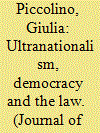| Srl | Item |
| 1 |
ID:
120369


|
|
|
|
|
| Publication |
2013.
|
| Summary/Abstract |
This article explores competing histories of independence in Côte d'Ivoire. The 2010 commemoration of fifty years of independence led to competing histories about how and if the nation achieved independence in 1960. The postelectoral crisis of 2010-2011 that followed soon afterwards has been interpreted by supporters of the outgoing president Laurent Gbagbo as an attempt by France and the international community to re-colonise Côte d'Ivoire. The article asks how different versions of this history are connected to different political projects and how they have changed through time. The article will analyse these processes of meaning-making in a historiology of Ivorian independence, thus contributing to constructivist accounts of nationhood, collective memory and historiography. The paper thus argues that different media of recalling the past in the present, such as commemoration and historiography, should be studied in a complementary manner to understand how (joint) remembering and forgetting are tools and mirrors of nations at work.
|
|
|
|
|
|
|
|
|
|
|
|
|
|
|
|
| 2 |
ID:
165116


|
|
|
|
|
| Summary/Abstract |
The literature on peacebuilding has increasingly emphasized the importance of the local level – a trend that has been called the local turn. For some researchers, the local turn can improve international peacebuilding interventions, while for others it is an agenda to promote an emancipatory and legitimate peace. There is however mixed evidence backing the argument that addressing local level issues in peacebuilding can make a substantial difference. The local turn reposes on assumptions that appear particularly problematic in an environment characterized by the lack of an elite-level pact, such as a conflict terminated in a military victory. Looking at the crisis in Côte d'Ivoire, which terminated in 2011 with the defeat of former president Laurent Gbagbo, this article highlights how the lack of elite level reconciliation compromises the effectiveness of actions aiming to promote local ‘social cohesion’. It also shows how the discourse and practices of the local turn can be appropriated by semi-authoritarian post-conflict governments in order to depoliticize the peacebuilding process. It concludes that the popularity of the ‘local turn’ among peacebuilders might be due more to the opportunity that it offers to eschew delicate national-level political issues, than to its supposed emancipatory potential.
|
|
|
|
|
|
|
|
|
|
|
|
|
|
|
|
| 3 |
ID:
131793


|
|
|
|
|
| Publication |
2014.
|
| Summary/Abstract |
Although much has been written about the ideology of Laurent Gbagbo's Front Populaire Ivoirien in Côte d'Ivoire and its impact on the Ivorian politico-military crisis, little attention has been paid to the ubiquitous role of the law in the discourse and political strategy of the pro-Gbagbo elite. The Ivorian case may provide important insights about the connection between ultranationalist ideology and a legalist, formalist conception of democracy and national sovereignty. The article analyses the circumstances of the emergence of 'legalist nationalism' in Côte d'Ivoire by looking at key episodes of the Ivorian transition between 2002 and 2012. The article discusses the relevance of Pierre Englebert's concept of 'legal command' and the turbulences of democratic transitions in accounting for the prominence of legalism in Ivorian politics. It explores the implications of the Ivorian case for understanding the connection between law and politics in Africa.
|
|
|
|
|
|
|
|
|
|
|
|
|
|
|
|
| 4 |
ID:
150580


|
|
|
|
|
| Summary/Abstract |
While significant obstacles to the realization of the Responsibility to Protect in practice remain, it has nonetheless made considerable progress in transforming from an idea to an emerging norm. At the same time, however, its sister component, the Responsibility to Rebuild has elicited less scholarly and policy attention. The lack of attention to rebuilding responsibilities has been made all the more urgent by the violent aftermath of the first protection intervention in Libya in 2011. Against this backdrop, the article examines the way in which the Responsibility to Rebuild is understood and operationalized, with reference to Libya and Côte d'Ivoire, theaters of two recent protection interventions. The conceptual evolution of the Responsibility to Rebuild reveals a distinct shift toward a more statist understanding of the rebuilding phase; what was initially considered a part of the wider international protection responsibility has come to be viewed as a domestic responsibility. This recalibration of the responsibility to rebuild stems from the concept's association with the reactive element of R2P as well as from the changes in the wider normative environment. The more statist understanding of rebuilding responsibilities has manifested itself not only in the emphasis on domestic ownership of the rebuilding process in the wake of protection interventions, but also in the reconceptualization of the wider international Responsibility to Rebuild as a narrower responsibility to assist in building the capacity of the state subjected to protection intervention. This has been problematic in policy terms as the attempt to build capacity through the standard state-building measures has resulted at best in negative peace and at worst in armed violence.
|
|
|
|
|
|
|
|
|
|
|
|
|
|
|
|